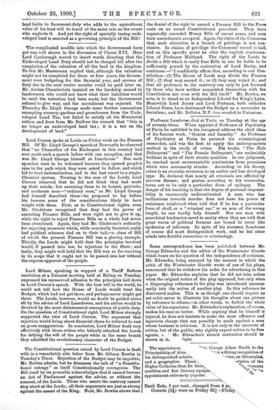• The Constitutional question raised by Lord Curzon is dealt
With in a remarkably able letter from Mr. Gibson Bowles in Tuesday's Times. Rejection of the Budget may be impolitic, Mr. Bowles admits, but he dismisses the talk of "a Constitu. tional outrage" as itself Constitutionally outrageous. The Bill itself by its preamble acknowledges that it cannot become an Act of Parliament against the advice, or without the consent, of the Lords. Those who assert the contrary cannot stop short at the Lords; all their arguments are just as strong against the assent of the King. Next, Mr. Bowles shows that the denial of the right to amend a Finance Bill to the Peers rests on. no sound Constitutional precedent. They have repeatedly amended Money Bills of recent years, and seen their amendments accepted. Again, the claim of the Commons that such alteration is a breach of privilege is not con- clusive. In claims of privilege the Commons' record is bad, and on this specific point he cites the explicit condemna- tion of Professor Maitland. The right of the Lords to divide a Bill which is really four Bills in one he holds to be sufficiently proved by the contention of Lord Derby, and continues :—" I confidently affirm that, according to our Con- stitution—(1) The House of Lords may divide the Finance Bill ; (2) they may amend it ; or (3) they may reject it; and that all pretences to the contrary can only be put forward by those who have neither acquainted themselves with the Constitution nor even with the Bill itself." Mr. Bowles, we note, is to stand as an Independent Liberal for King's Lynn. Meanwhile Lord Joicey and Lord Portman, both orthodox Liberal Peers, have denounced the Budget as a surrender to Socialism; and Mr. Bellairs, M.P., has seceded to Unionism.










































 Previous page
Previous page